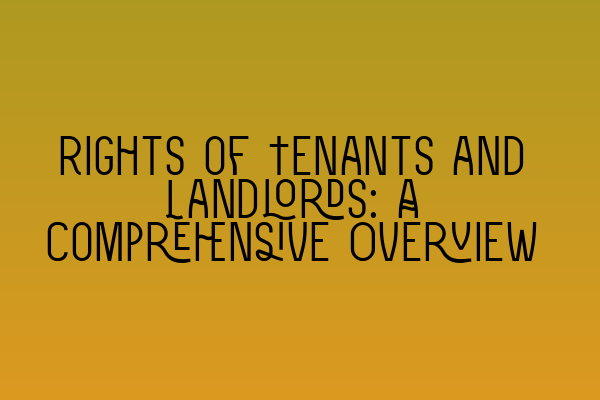Rights of Tenants and Landlords: A Comprehensive Overview
As a solicitor specializing in property law and land law, it is essential to have a thorough understanding of the rights and responsibilities of both tenants and landlords. Whether you are a tenant looking for information on your rights, or a landlord seeking clarity on your legal obligations, this comprehensive overview will provide you with the essential knowledge you need.
1. Introduction to Tenancy Laws:
Tenancy laws govern the relationship between tenants and landlords. Understanding these laws is crucial for both parties to ensure a fair and legally binding tenancy agreement. When entering into a tenancy agreement, it is important to understand the type of tenancy you are entering into:
a. Assured Shorthold Tenancy (AST)
b. Assured Tenancy
c. Secure Tenancy
d. Excluded Tenancy or Licence
Each type of tenancy carries its own rights and obligations. For an in-depth analysis of the various types of tenancies, please refer to our related article on SQE Property Law and Land Law: [Link to article: Understanding Contractual Capacity: Rights and Limitations].
2. Tenant’s Rights:
Tenants have several rights that protect them during their tenancy. These rights include:
a. Right to live in a safe and habitable property
b. Right to have their deposit protected in a government-approved scheme
c. Right to be free from unfair eviction
d. Right to challenge unfair rent increases
e. Right to have repairs and maintenance carried out by the landlord
f. Right to privacy and peaceful enjoyment of the property
To learn more about tenant rights, please refer to our related article on Misrepresentation in Contracts: Unveiling Deceptive Practices.
3. Landlord’s Obligations:
Landlords also have a set of legal obligations that they must comply with. These include:
a. Providing a safe and habitable property for the tenant
b. Ensuring the property meets all necessary health and safety standards
c. Protecting the tenant’s deposit in a government-approved scheme
d. Providing the tenant with a written tenancy agreement
e. Carrying out necessary repairs and maintenance in a timely manner
f. Giving the tenant proper notice before entering the property
For a comprehensive understanding of landlord obligations, please refer to our related article: SQE Contract Law: Analyzing Landmark Cases and Influential Judicial Decisions.
4. Dispute Resolution:
Despite the best efforts of both tenants and landlords, disputes may sometimes arise during the tenancy. In such cases, it is essential to know the proper channels for dispute resolution. These channels include:
a. Communication and negotiation between the tenant and landlord
b. Mediation services provided by third-party organizations
c. Seeking legal advice and representation
d. Taking the dispute to court as a last resort
To test your knowledge on dispute resolution and other aspects of contract law, consider trying our Interactive SQE Mock Tests for Contract Law: Test Your Knowledge.
5. Further Resources:
For further guidance and insights into property law and land law, we invite you to join our SQE Contract Law Webinars: Expert Insights and Guidance. These webinars provide a platform for legal professionals to share their expertise and answer your questions.
In conclusion, understanding the rights and responsibilities of tenants and landlords is crucial for a successful and harmonious tenancy. By being aware of the rights and obligations outlined above, both parties can minimize disputes and ensure their legal rights are protected. For personalized legal advice and assistance, it is always advisable to consult with a qualified solicitor specializing in property law and land law.
For more information on related topics, please refer to our related articles in SQE Property Law and Land Law:
1. Misrepresentation in Contracts: Unveiling Deceptive Practices
2. SQE Contract Law: Analyzing Landmark Cases and Influential Judicial Decisions
3. Understanding Contractual Capacity: Rights and Limitations
4. Interactive SQE Mock Tests for Contract Law: Test Your Knowledge
5. Join Our SQE Contract Law Webinars: Expert Insights and Guidance
